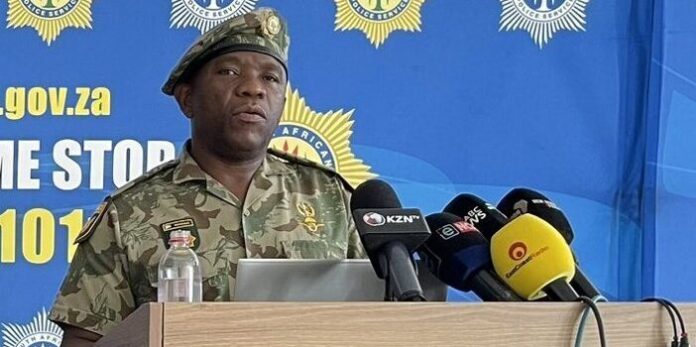A Justice, Crime Prevention and Security Cluster social media post reminding police officers that wearing buffs or face coverings in uniform is against South African Police Service (SAPS) rules has triggered a backlash online, with X users accusing the department of targeting Lieutenant-General Nhlanhla Mkhwanazi.
The uproar comes weeks after Mkhwanazi’s explosive July 6 media briefing, delivered alongside masked, heavily armed officers, which led to Police Minister Senzo Mchunu being placed on leave and triggered both a judicial commission of inquiry and a parliamentary ad hoc committee probe.
Official notice
On Friday, the official @CrimeWatch_RSA account posted a statement titled “Wearing of buffs with uniform: Members of the South African Police Service.”
The notice stressed that police officials are prohibited from covering their faces while in uniform, except for members of specialised units deployed on approved operations. These are the Special Task Force, National Intervention Unit, and Tactical Response Team. It also stated that under no circumstances may the SAPS emblem be printed on such gear.
While framed as a routine policy reminder, the timing of the statement quickly drew suspicion. Many X users linked it to Mkhwanazi’s headline-making media briefing in Durban last month. He appeared flanked by masked elite officers at the briefing.
That briefing was a political earthquake. Mkhwanazi dropped a string of allegations that ultimately saw Mchunu placed on leave. And it prompted parallel investigations by a judicial commission and Parliament.
Public opinion divided
One user, responding to the social media post, wrote: “We all know that you’re saying this to deal with General Mkhwanazi. Deal with crime and stop being petty. Leave the General alone.”
Another questioned why the statement was broadcast on social media rather than sent internally to SAPS members. It suggested that the goal was to shape public opinion rather than merely remind officers of the rules.
Some replies honed in on whether the officers alongside Mkhwanazi met the stated exemptions.
“During approved and specialised operations! Those who were with Lt General Mkhwanazi on the 6th July fall under this category of operation,” one user posted.
Others widened the debate, pointing to broader issues of police accountability.
“What are my rights if a police officer talks to me without wearing a name badge?” asked one user. Another complained that officers had “long stopped” identifying themselves, with little action from authorities.
In line with Code of conduct
Not all responses were hostile. A few welcomed the post, with one commenter writing: “What a relief. Thank you very much. This on its own does make a difference.”
The SAPS code of conduct mandates visible identification for accountability and transparency. Except in high-risk situations where concealing identity is essential for safety and operational integrity. Yet in a climate where Mkhwanazi’s name is at the centre of one of the biggest policing scandals in years, even a standard reminder about buffs has become a lightning rod.



